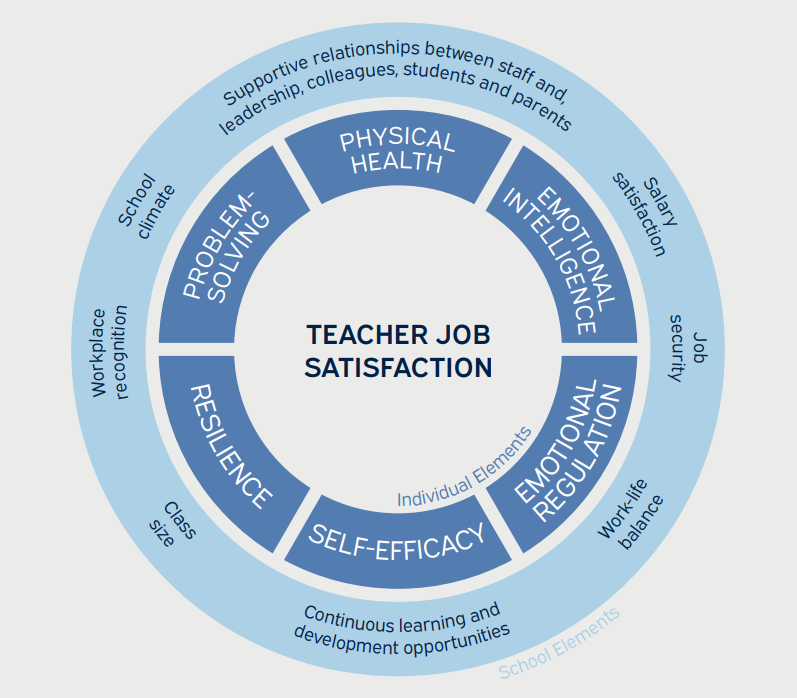
Recent studies have shown that more than half of Australia’s teachers struggle with anxiety, with nearly one-fifth battling depression. One of the root causes of this crisis, according to the teachers themselves, is unsustainable workloads – a factor that is also driving workforce shortages.
Indeed, this is an issue that is being felt in schools globally. However, research into teacher wellbeing is still largely focused on, and conducted in, Western, wealthy, nations and experts say these studies are missing key insights from under-researched populations such as the global South and developing countries.
Recognising this, the International Baccalaureate (IB) has commissioned the Wellbeing Research Centre at Oxford University to produce a report on the latest research on the critical issue of teacher wellbeing.
The aim of the researchers was to investigate how wellbeing could be programmed across the International Baccalaureate curricula with a view to a new approach to wellbeing across the IBO by 2030.
“As we navigate the crucial intersection of education and wellbeing, the research evidence highlights the profound importance of prioritising teacher wellbeing,” Dr Laura Taylor, Deputy Director of the Wellbeing Research Centre at the University of Oxford and Lead Researcher for the project, said.
“By investing in the health and happiness of educators, we not only empower them to thrive but also lay the foundation for a positive ripple effect on students, schools, and the broader education system.”
What the study found
The ‘Wellbeing for Schoolteachers’ study provides the IB, policymakers and educational leaders an understanding of teacher wellbeing, what influences teacher wellbeing, and what evidence-based interventions might be used to improve teacher wellbeing.
The report revealed an increasing body of research indicating that teacher-related factors are some of the most essential elements impacting learning in schools.
Across countries and school grade levels, the researchers found high levels of teacher stress, depression, anxiety, and poor physical health.
Teachers were shown to report one of the highest levels of occupational stress and burnout on the job, compared with other professions, with workload one of the most prominent factors leading teachers to leave the profession.
“Recently, the teaching profession is characterized by high teacher shortages, high attrition rates, and difficulties in recruiting new candidates,” the report stated, adding that researchers believe that these characteristics, as well as annual increases in psychiatric-related absenteeism, are highly influenced by low teacher wellbeing in schools.
The report also found that teachers feel ill-equipped and untrained in the use of ICT, despite its extensive use in classrooms.
Just 56% of teachers in the OECD have received formal education or training in the use of ICT for teaching. Furthermore, a significant disparity in ICT training was found across nations. Inadequate competency and training in the use of ICT contribute to increased teacher workload and work-related stress.

A framework for success?
Drawing from the findings of their comprehensive study, the researchers developed a preliminary teacher wellbeing framework with areas that show promise for being drivers of teacher wellbeing.
However, the researchers cautioned that their framework is not definitive and should be used primarily as a discussion point amongst school stakeholders, and its contents will change over time as the literature progresses.
“Each school is a unique ecosystem, and some of the drivers will be more relevant to your context than others,” they noted.
“It is important to use staff voice to identify drivers of wellbeing in your setting and to take measurements that can give school stakeholders further insights into what factors are important in their context.”
The researchers said the framework is therefore intended “as a catalyst for schools to embark on further investigations into their own teacher wellbeing, fostering a proactive approach to cultivating a positive and supportive work environment for educators.”
“Utilising this framework, along with a consideration of each school’s unique ecosystem, and increasing opportunities for staff and pupil voice, empowers schools to tailor their strategies and interventions, ultimately contributing to the holistic wellbeing of their teaching staff.
